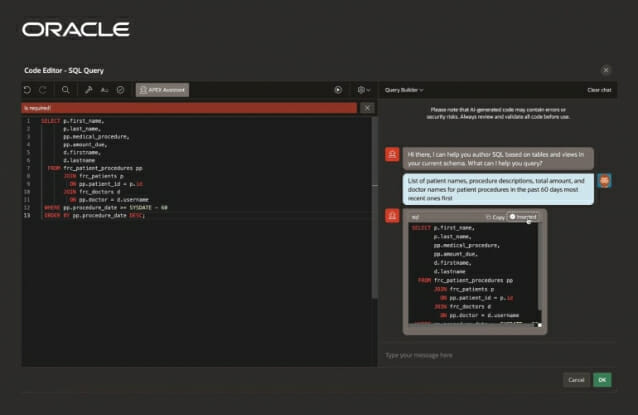Oracle announces that it is adding code generation tools powered by generative AI to the latest version of its low-code development platform, Oracle Apex.
Therefore, the Apex AI assistant should simplify the application development process. Enough to allow developers to build mission-critical applications at scale faster.
The wizard operation works through prompts. Developers define desired features and components. And then here’s the job of AI:
- Generating SQL statements
- One-click bug fixes
- Automatic saving of table names
- Add ready-to-use interactive interfaces to existing applications
Automating the writing of SQL queries
In detail, the AI assistant remembers SQL syntax and automates the writing of SQL queries. It also provides explanations of existing code and suggests bug fixes.
The AI Conversational Interfaces feature makes it easy to add out-of-the-box conversational interfaces to existing apps, allowing end users to “talk” to the app in natural language.
“For developers who write SQL statements every day, remembering the names and syntax of rarely used tables and columns can be a challenge,” said Mike Hitch, vice president of software development at Oracle. “An AI assistant that can help them name columns in context, do JOINs, generate complex syntax.”
21 million Apex apps
Oracle Apex is available free of charge for all Oracle Database services, including Oracle Database and Oracle Self-Hosted Database, the company announced.

Oracle explains that this tool replaces traditional coding to create mission-critical applications and allows you to develop “20x faster with 100x less code.”
The publisher explains that Apex has been used to create more than 21 million apps and that the platform is used by 850,000 developers.
A platform integrated with Oracle tools
The platform is included in Oracle Database services, including Oracle Database and Oracle Autonomous Operations.
For example, Oracle Database 23ai’s vector AI search capabilities combined with Oracle Apex enable semantic search of documents, images and other unstructured data, Oracle explains.

